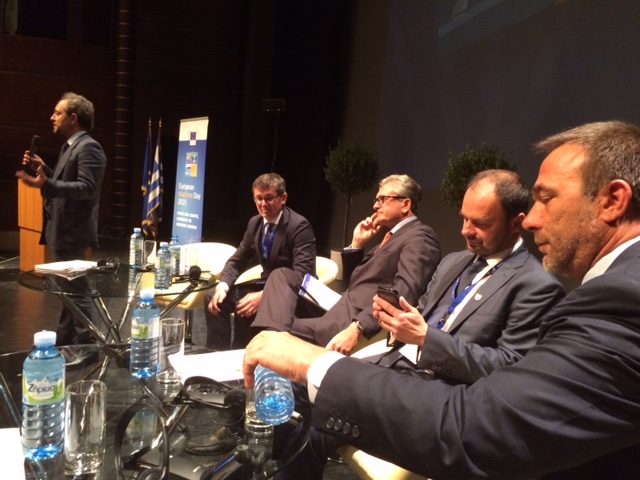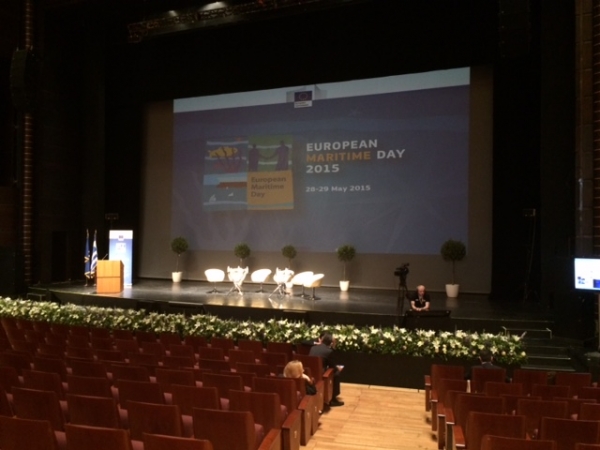More than 1.000 stakeholders and experts on the Blue economy gathered in Athens on 28th and 29th of May to discuss the future of Blue growth. PortEconomics member Michaël Dooms was invited in a high-level panel to share his views on the general theme “Ports: innovation hubs of the Blue Economy” along with Mr. Rémi Mayet from the European Commission, DG MOVE, Antonio Revedin, Director Strategic Planning and Development of the Venice Port Authority, Mr. Adam Banaszak, Member of the Committee of the Regions, and mr. Petros Kokkalis, Council Member of Piraeus Municipality. Dr. Antonis Michail, senior policy advisor at ESPO, chaired and animated the panel.
 The session proved highly interactive with a turnout of about 150 people, and led to several interesting remarks and conclusions to move forward on the level of innovation within and for ports. As innovation in ports is closely related to asset management, a major part of the discussion focused around the need for a strong license to operate to develop the asset bundles which ports represent. It implies the development of innovative projects allowing a more flexible use of infrastructure, and empowering port authorities to become ‘engines of growth’. Mr. Mayet discussed the European Commission initiatives towards that objective, such as the CEF fund as well as the European Port Policy proposals. One of the main elements remains the identification of innovative projects out of the strategic challenges that ports face. Working around innovation also means allowing for failure on the one hand, but also reducing the risk by selecting the best projects, both on the level of the port authority, the city, the region, and the national / European dimension. Strategies and project identification could and should be based within a joint intelligence buildup between stakeholders, in order to strengthen the license to operate as ports often operate within a city and a region, where both positive and negative externalities are generated. Examples of these challenges are abundantly present at the Venice Port Authority, and were highlighted by Mr. Revedin. On the level of the city and the region, both mr. Banaszak and mr. Kokkalis referred to the constant evolution of the ports in relation to their cities and regions, in the case of Piraeus the port has changed faces already multiple times during the last 2500 years. PortEconomics member Michaël Dooms raised the challenge of a common learning environment based on performance data on the Triple Bottom Line (Prosperity, Planet and People), and the need to integrate more strongly the local community perceptions into port cluster strategy formulation. A clear need exists on the level of digitalization and development of cost efficient ICT tools to facilitate this development, in particular for smaller and medium size ports, where the managing bodies often lack the resources to invest in the necessary intelligence tools to foster and drive innovative projects with their stakeholders. The PORTOPIA project, involving PortEconomics.eu members, was mentioned as an example to achieve this, although many challenges exist, in particular regarding data availability, which led to stressing the need for “Open Data” or a “New Deal on Data” to improve the generation of the necessary insights needed to identify, implement and monitor innovation.
The session proved highly interactive with a turnout of about 150 people, and led to several interesting remarks and conclusions to move forward on the level of innovation within and for ports. As innovation in ports is closely related to asset management, a major part of the discussion focused around the need for a strong license to operate to develop the asset bundles which ports represent. It implies the development of innovative projects allowing a more flexible use of infrastructure, and empowering port authorities to become ‘engines of growth’. Mr. Mayet discussed the European Commission initiatives towards that objective, such as the CEF fund as well as the European Port Policy proposals. One of the main elements remains the identification of innovative projects out of the strategic challenges that ports face. Working around innovation also means allowing for failure on the one hand, but also reducing the risk by selecting the best projects, both on the level of the port authority, the city, the region, and the national / European dimension. Strategies and project identification could and should be based within a joint intelligence buildup between stakeholders, in order to strengthen the license to operate as ports often operate within a city and a region, where both positive and negative externalities are generated. Examples of these challenges are abundantly present at the Venice Port Authority, and were highlighted by Mr. Revedin. On the level of the city and the region, both mr. Banaszak and mr. Kokkalis referred to the constant evolution of the ports in relation to their cities and regions, in the case of Piraeus the port has changed faces already multiple times during the last 2500 years. PortEconomics member Michaël Dooms raised the challenge of a common learning environment based on performance data on the Triple Bottom Line (Prosperity, Planet and People), and the need to integrate more strongly the local community perceptions into port cluster strategy formulation. A clear need exists on the level of digitalization and development of cost efficient ICT tools to facilitate this development, in particular for smaller and medium size ports, where the managing bodies often lack the resources to invest in the necessary intelligence tools to foster and drive innovative projects with their stakeholders. The PORTOPIA project, involving PortEconomics.eu members, was mentioned as an example to achieve this, although many challenges exist, in particular regarding data availability, which led to stressing the need for “Open Data” or a “New Deal on Data” to improve the generation of the necessary insights needed to identify, implement and monitor innovation.
Finally, based on audience interaction, the need to blend port activities with incubators and R&D facilities in order to foster port innovation, bringing them closer or into the area, was highlighted. The panel agreed that local and regional spatial planning laws often hamper the multifunctional development of port areas, implying a need for research into best practices on this level.
You may freely download Michael’s presentation @PortEconomics.eu.












